
How to Get Closer to God: A Step-by-Step Biblical Guide
Introduction: Why Drawing Closer to God Matters
Do you ever feel like God is far away? Maybe your days are full of tasks, your mind is noisy, and your heart feels dry. You want to pray but don’t know where to start. You long for deeper connection but feel like time, stress, and distractions always win.
You’re not alone. Many women wrestle with this same tension — a desire for closeness with God, paired with the struggle of busyness, overwhelm, and spiritual fatigue. The good news is that Scripture offers hope: “Draw near to God, and He will draw near to you” (James 4:8).
Closeness with God is not about doing everything perfectly. It’s about daily steps of faith, simple habits that open space for His presence in ordinary life. In this guide, we’ll explore biblical principles and practical steps that make intimacy with God not only possible but joyful — even in busy, stressful seasons.
Here, you’ll find clear direction on prayer, Scripture, worship, rest, and everyday faithfulness. Each section is anchored in the Bible, paired with small actions you can start today.
Take a deep breath. You don’t have to chase God — He’s already near. This is your invitation to slow down, surrender, and grow closer to Him step by step.
Helpful reads:
╔══════════════════════════════╗
🌿 Grace note
“Closeness with God isn’t built in one giant leap, but in daily, faithful steps.”
╚══════════════════════════════╝
2. The Bible’s Invitation to Draw Near
“Draw near to God, and he will draw near to you.” — James 4:8
Closeness with God begins with His invitation. The Bible doesn’t present intimacy with God as something rare or unreachable, reserved only for a few. Instead, it is offered to all who belong to Him. From Genesis to Revelation, God repeatedly calls His people into fellowship with Him — walking in the garden, dwelling in the tabernacle, abiding through Christ.
What’s striking about James 4:8 is the promise: when you take even one small step toward God, He moves toward you. Closeness isn’t about achieving a perfect routine, but about a willing heart that says, “Lord, I want You.”
Other passages echo this invitation: “Come near to God and he will come near to you” (Hebrews 10:22), “Seek the Lord while he may be found” (Isaiah 55:6), and Jesus’ own words, “Remain in me, as I also remain in you” (John 15:4). These verses remind us that intimacy with God is always relational, never transactional.
Practical Takeaway: Each morning, begin with a simple prayer of invitation: “Lord, today I want to walk closer with You. Help me see Your presence in my ordinary moments.”
Helpful reads:
Download your Invitation to Draw Near card (phone friendly)
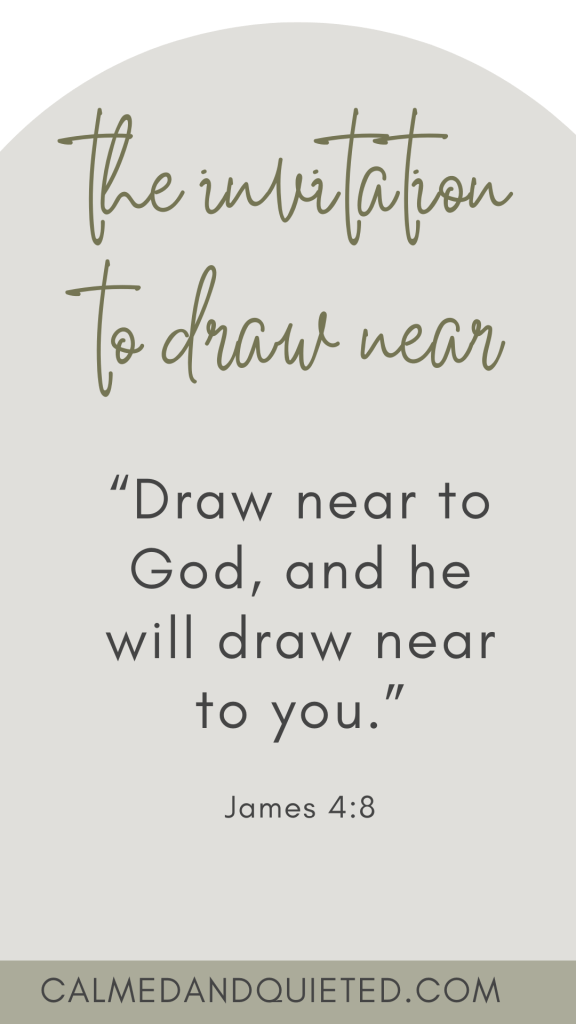
3. Start with the Heart: Surrender Before Steps
“Search me, God, and know my heart; test me and know my anxious thoughts. See if there is any offensive way in me, and lead me in the way everlasting.” — Psalm 139:23–24
Before you try new routines, longer prayers, or ambitious reading plans, begin here: with your heart open before God. Closeness doesn’t start with doing more — it starts with surrender.
Many of us try to approach God with full calendars, distracted minds, and restless hearts. But He isn’t asking for polished prayers or perfect consistency. He is asking for honesty, humility, and willingness. Psalm 51:17 says, “A broken and contrite heart you, God, will not despise.”
Surrender means acknowledging the distractions, perfectionism, or self-reliance that pull you away from Him. It means laying down the need to “get it right” and instead whispering, “Lord, I need You.” From that place, the steps you take — prayer, Scripture, worship — become acts of love, not duty.
Practical Takeaway: Begin each day with a heart check. Pray Psalm 139:23–24 slowly, and then jot down one thing you sense God inviting you to release: hurry, comparison, fear, or anything that clutters your closeness with Him.
Helpful reads:
Download your Daily Surrender Prayer card (phone-friendly)
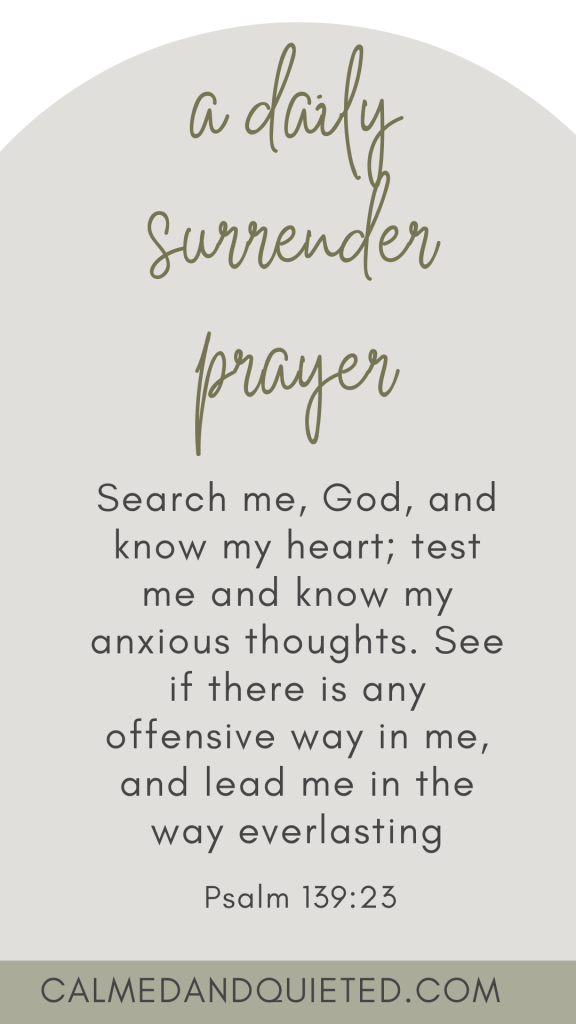
4. Building a Consistent Prayer Life
“Devote yourselves to prayer, being watchful and thankful.” — Colossians 4:2
Prayer is the heartbeat of closeness with God. Yet for many of us, it feels like the first thing to slip when life gets busy. We imagine prayer must be long, eloquent, or deeply emotional, and when we fall short, guilt creeps in. But Scripture reminds us that prayer is simply conversation with a loving Father — honest, regular, and real.
Consistency matters more than length. Jesus often prayed in solitude (Mark 1:35), but He also gave us the Lord’s Prayer as a short, daily model (Matthew 6:9–13). Your prayer life can be woven into your day: a whispered “thank You” at sunrise, a breath prayer in the middle of stress, a quiet moment before bed.
Start small. Five minutes daily is far better than an hour once a week that never lasts. Over time, those small seeds of faith grow into deeper intimacy with God.
Practical Takeaway: Choose one anchor point in your day — morning coffee, lunch break, or before bed — and commit to a short, honest prayer there. Let it become your rhythm.
Download your Prayer Rhythm card (phone-friendly)
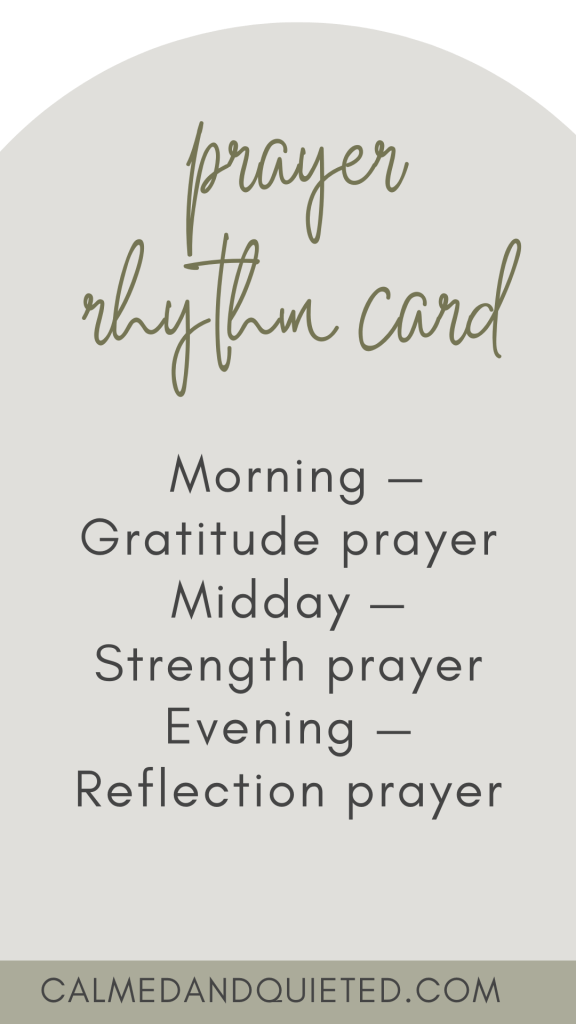
5. Listening Through Scripture
“All Scripture is God-breathed and is useful for teaching, rebuking, correcting and training in righteousness.” — 2 Timothy 3:16
If prayer is speaking to God, Scripture is how He speaks back. The Bible is not just a book of information — it’s a living word that shapes hearts and reveals God’s character. Yet many women feel overwhelmed by the idea of daily Bible reading. Where do you start? How much should you read?
The truth is, closeness comes through consistency, not quantity. Even a few verses, read slowly and prayerfully, can feed your soul more deeply than racing through chapters. Think of Scripture as daily bread (Matthew 4:4). You don’t need a feast every time — just enough to nourish you for the day ahead.
Try reading with curiosity: What does this reveal about God? How does it guide me today? When you approach the Bible as conversation, not homework, you’ll begin to hear His voice more clearly.
Practical Takeaway: Choose one gospel (like John) and read just a few verses each day. Write down one truth or promise, and carry it with you to meditate on throughout the day.
Download your Scripture Habits Checklist card (phone-friendly)
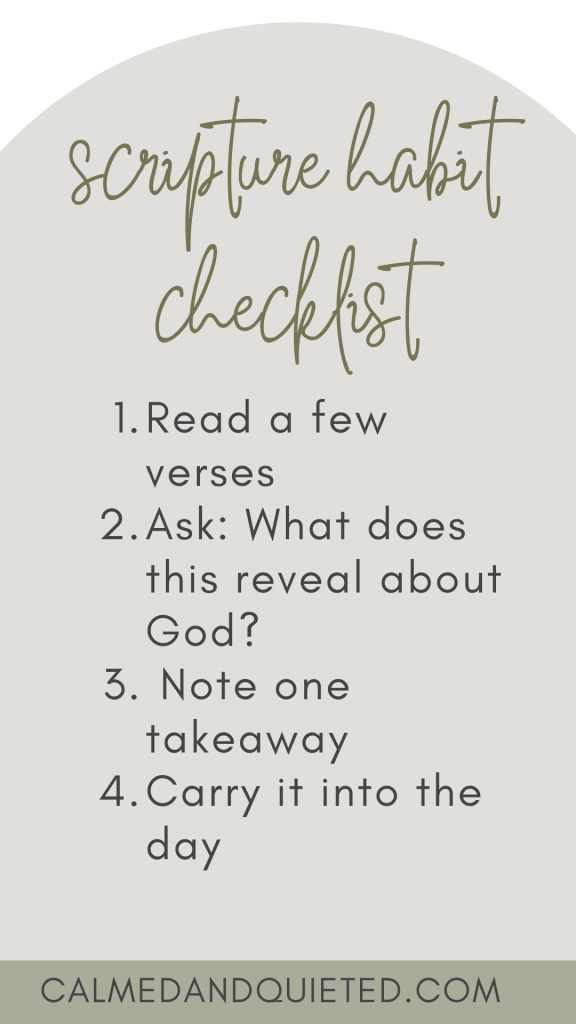
6. Worship Beyond Sundays
“Therefore, I urge you, brothers and sisters, in view of God’s mercy, to offer your bodies as a living sacrifice, holy and pleasing to God—this is your true and proper worship.” — Romans 12:1
For many, worship is something tied to Sunday mornings: singing in church, raising hands, hearing the Word. But biblical worship is far bigger than that. It’s not just what we do once a week — it’s how we live every day.
Worship happens when we choose gratitude instead of complaining, when we act in obedience even when it’s hard, and when we pause to notice God’s presence in ordinary tasks. Colossians 3:17 reminds us, “Whatever you do, whether in word or deed, do it all in the name of the Lord Jesus.” That means your work, conversations, meals, and quiet moments can all become worship when done with a heart toward Him.
This shift is freeing. Worship is not limited to music or a church service — it’s available every moment you choose to honor God with your thoughts, actions, and attitudes.
Practical Takeaway: Pick one ordinary activity this week (like cooking, walking, or commuting) and intentionally turn it into worship by thanking God or singing a simple song of praise while you do it.
Download your Everyday Worship Ideas card (phone-friendly)
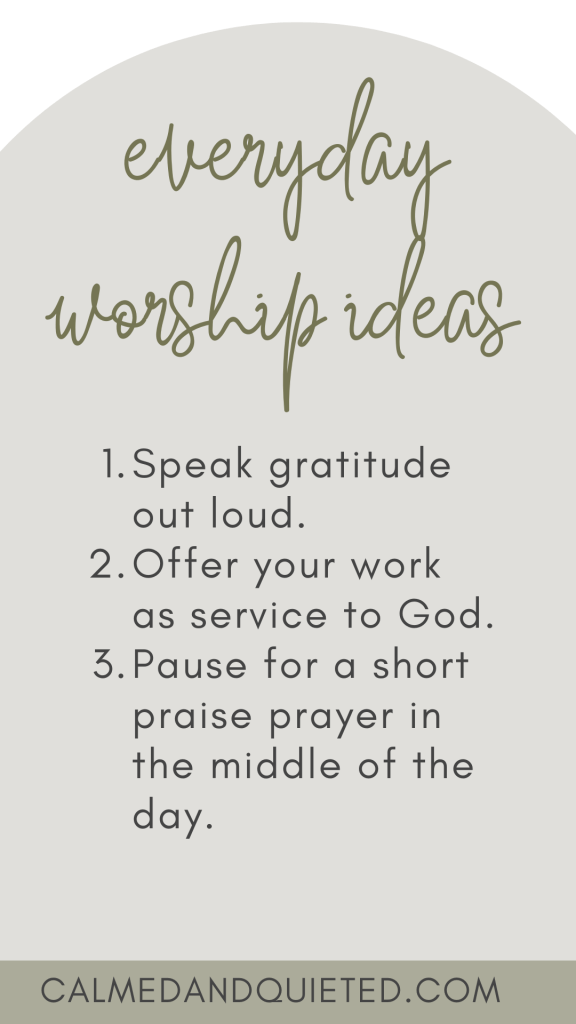
7. The Role of Community
“And let us consider how we may spur one another on toward love and good deeds, not giving up meeting together, as some are in the habit of doing, but encouraging one another.” — Hebrews 10:24–25
Growing closer to God is not meant to be a solo journey. While personal prayer and Scripture are vital, the Bible makes it clear that community strengthens faith. Fellowship gives us encouragement when we’re weak, correction when we wander, and joy when we celebrate together.
Even Jesus surrounded Himself with disciples, teaching and praying with them. Community provides accountability that helps us remain consistent in spiritual habits. It also reminds us we’re not alone in our struggles — others share the same challenges of busyness, distraction, and spiritual dryness.
Closeness with God often grows as we walk alongside His people. Serving, praying, or simply sharing life with other believers draws us nearer to His heart.
Practical Takeaway: Reach out to one trusted friend this week and ask if you can pray together, even for 10 minutes. If you don’t have that yet, consider joining a small group at church or an online Christian community for support.
Download your Community Reflection card (phone-friendly)
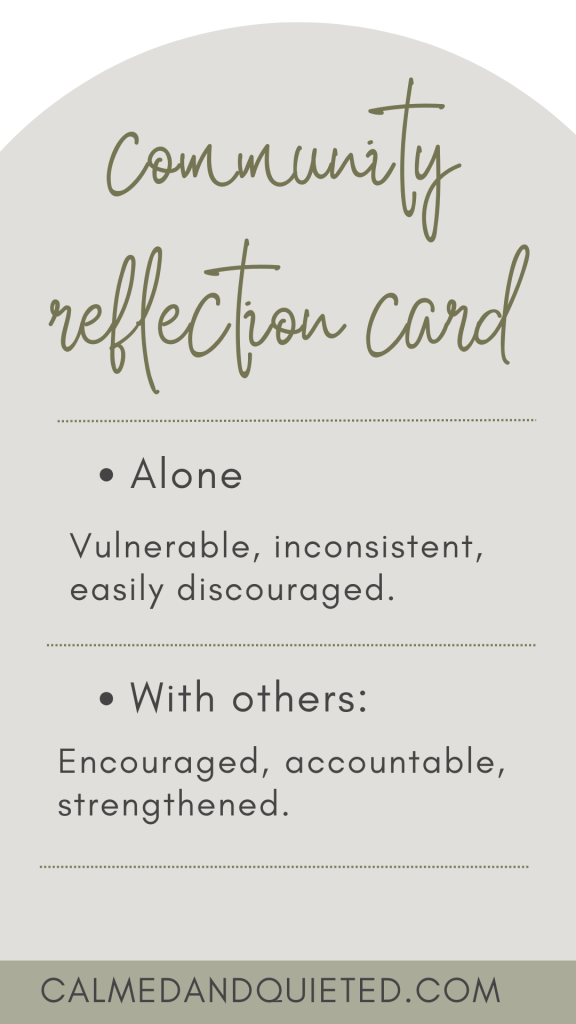
8. Sabbath, Rest, and Stillness
“Be still, and know that I am God.” — Psalm 46:10
One of the most overlooked ways to draw closer to God is by slowing down. In a culture that equates busyness with worth, stillness feels unnatural — even wasteful. Yet God commanded His people to rest, not as an optional luxury but as a rhythm for life: “Remember the Sabbath day by keeping it holy” (Exodus 20:8).
Sabbath is more than taking a day off. It’s about pausing to remember that God is in control, not us. Stillness gives space for prayer, reflection, and renewed trust. It reminds us that closeness to God isn’t found in constant activity but in quiet attention to His presence.
If you’ve been running nonstop, stillness might feel uncomfortable at first. But often, it’s in the silence that we hear God most clearly.
Practical Takeaway: This week, block out one hour to step away from screens, work, and noise. Use it for prayer, journaling, or simply sitting outside in God’s creation. Begin small, and let that stillness expand into a Sabbath rhythm.
╔══════════════════════════════╗
🌿 Grace note
“Rest is not wasted time. It’s worship — a weekly reminder that God is God, and we are not.”
╚══════════════════════════════╝
9. Overcoming Spiritual Dryness
“My soul thirsts for God, for the living God. When can I go and meet with God?” — Psalm 42:2
Every believer experiences seasons of dryness. You may feel like your prayers bounce back unheard, or that Scripture no longer speaks with the same freshness. Spiritual dryness is not a sign that you’ve failed — it’s part of the journey of faith. Even the psalmists cried out from places of silence and longing.
The danger is believing dryness means distance. God is still present, even when He feels hidden. These seasons often deepen faith, teaching us to rely on His character rather than our emotions. Isaiah 41:10 reminds us: “Do not fear, for I am with you; do not be dismayed, for I am your God.”
Practical ways to move through dryness include praying the Psalms aloud, practicing gratitude, or serving others even when your own heart feels weary. Often, closeness is rekindled in small, faithful steps.
Practical Takeaway: Choose one psalm of lament (like Psalm 42 or 63) and pray it daily for a week. Let the words of Scripture express what your heart struggles to find.
Feelings vs. Truth in Dry Seasons
What I Feel
- God is silent
- My prayers don’t matter
- I’m alone
What God Promises
- God is present (Isaiah 41:10)
- He hears every cry (Psalm 34:17)
- He will never leave me (Hebrews 13:5)
10. Obedience — Walking Daily in God’s Will
“If you love me, keep my commands.” — John 14:15
Closeness with God is not only about prayer, Scripture, or worship — it’s about living in obedience. Obedience doesn’t always feel exciting; sometimes it looks like choosing honesty when it would be easier to hide, or extending forgiveness when you’d rather hold on to hurt. But each act of obedience draws us closer to His heart.
Obedience is love in action. Jesus said that following His commands flows from relationship, not duty. When we obey, we declare: “Lord, I trust You more than my feelings or my plans.”
This doesn’t mean perfection. Every believer stumbles. But small daily acts of faithfulness — speaking truth, serving quietly, or resisting temptation — train our hearts to walk in step with God. Over time, obedience builds intimacy because it keeps us aligned with His will.
Practical Takeaway: Today, ask God to show you one simple act of obedience. It may be reaching out to someone in need, confessing a hidden struggle, or pausing to pray before making a decision. Let love, not fear, lead your obedience.
╔══════════════════════════════╗
🌿 Grace note
“Obedience isn’t about earning God’s love — it’s about living in it.”
╚══════════════════════════════╝
11. Using Your Time Wisely
“Be very careful, then, how you live—not as unwise but as wise, making the most of every opportunity…” — Ephesians 5:15–16
Time is one of the most precious resources God entrusts to us. Yet it’s often the first thing we squander — lost to distractions, overcommitment, or endless multitasking. The Bible calls us to steward our time with wisdom, not to pack more into our schedules, but to use each moment for what truly matters.
Using your time wisely doesn’t mean rushing. It means aligning your hours with God’s purposes. Sometimes that looks like diligent work (Colossians 3:23), and sometimes it looks like slowing down to rest or serve. True wisdom comes in discerning what this season requires — and being willing to let go of what doesn’t fit.
When you begin to see time as a gift, even ordinary days take on eternal significance.
Practical Takeaway: At the start of each week, write down your three top priorities — one spiritual, one relational, and one practical. Let those guide how you spend your hours instead of letting busyness dictate your focus.
Download your Weekly Priorities card (phone-friendly)
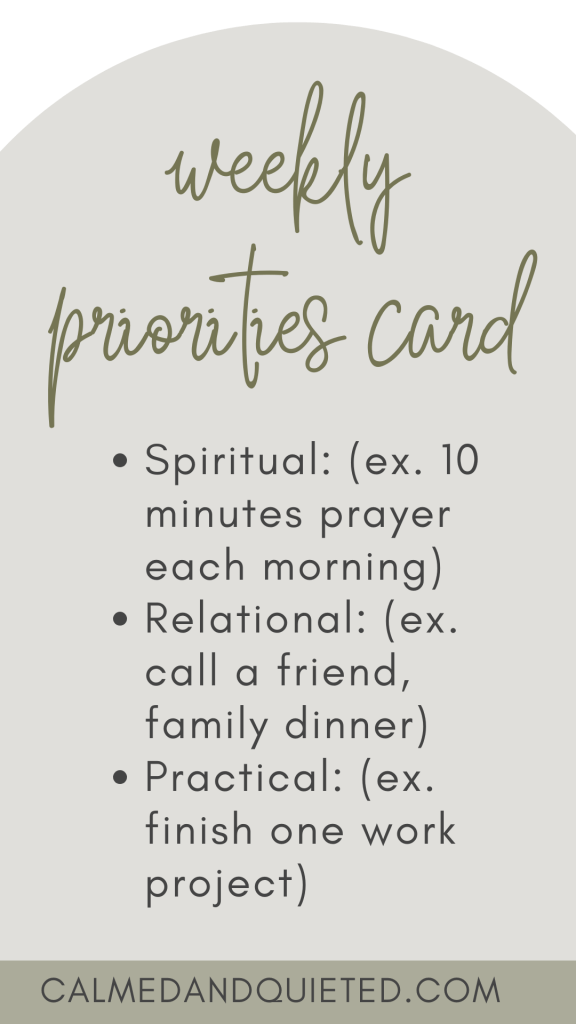
12. Gratitude as a Path to Closeness
“Give thanks in all circumstances; for this is God’s will for you in Christ Jesus.” — 1 Thessalonians 5:18
Gratitude shifts the heart. When you practice thankfulness, you stop focusing on what’s missing and start seeing God’s presence in what’s already here. Gratitude is worship in its simplest form — a daily reminder that every good gift comes from Him (James 1:17).
Gratitude doesn’t mean ignoring hardship. Paul wrote 1 Thessalonians 5:18 while facing trials, not comfort. The secret is that thanksgiving opens the door to intimacy, even in difficult seasons. When you give thanks, you realign your perspective, soften anxiety, and invite joy back into your walk with God.
It’s often the smallest thanks — for food on the table, a sunset, or the strength to keep going — that grow into deeper awareness of His goodness.
Practical Takeaway: Start a “gratitude journal” with three things you thank God for each day. Over time, this simple habit will train your heart to see Him in both ordinary and challenging moments.
Gratitude Reflection Table
Morning
- Thank God for one new day
Midday
- Thank God for one person
Evening
- Thank God for one blessing
13. Nature as a Classroom of God’s Presence
“For since the creation of the world God’s invisible qualities—his eternal power and divine nature—have been clearly seen, being understood from what has been made.” — Romans 1:20
Creation is one of God’s first love letters to us. Long before Scripture was written, the heavens and the earth testified to His majesty (Psalm 19:1). When life feels overwhelming or distant from God, stepping into nature can reawaken wonder and draw your heart back to Him.
Nature slows us down. The rhythm of seasons, the steadiness of mountains, the beauty of flowers remind us of God’s power and care. Even Jesus often retreated to quiet, natural places to pray (Luke 5:16). For the weary soul, time outdoors can become a sanctuary — no walls, no distractions, just God’s presence revealed in creation.
You don’t need a forest or ocean nearby. A small walk in a park, noticing birds, or watching a sunrise can turn into worship when done with attentiveness to the Creator.
Practical Takeaway: This week, set aside 15 minutes outdoors without your phone. As you walk or sit, thank God for one specific thing you notice — a tree, a cloud, or the fresh air. Let it remind you of His faithfulness.
Download your Nature & God Reflection card (phone-friendly)
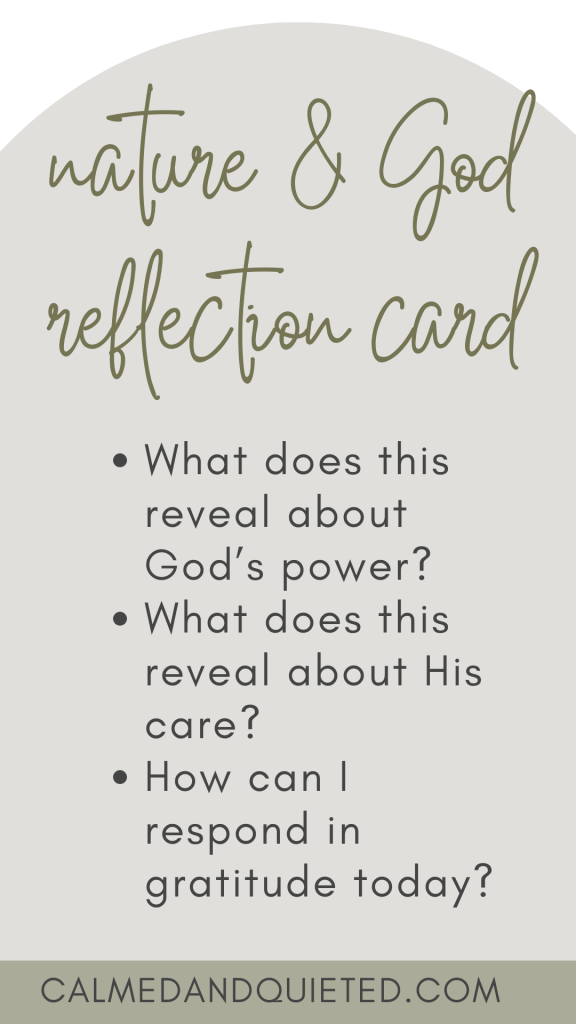
14. Trusting God’s Timing in Your Journey
“There is a time for everything, and a season for every activity under the heavens.” — Ecclesiastes 3:1
Few things test closeness with God more than waiting. Whether you’re waiting for a prayer to be answered, a dream to be fulfilled, or a burden to lift, the delay can feel like distance. But the Bible reminds us that God’s timing is never late and never rushed. He works in seasons, and every one of them has purpose.
Trusting His timing means surrendering control. Isaiah 60:22 promises, “When the time is right, I, the Lord, will make it happen.” Delays often prepare us — shaping our character, deepening our dependence, and protecting us from things we can’t yet see.
Instead of striving to force outcomes, intimacy with God grows when we learn to rest in His pace. The waiting becomes less about the answer and more about knowing Him in the process.
Practical Takeaway: Write down one area where you’re waiting on God — then pray Ecclesiastes 3:1 over it daily this week. Ask Him to help you trust His season, even if you don’t yet see the fruit.
╔══════════════════════════════╗
🌿 Grace note
“Waiting is not wasted. God’s timing shapes us as much as it delivers us.”
╚══════════════════════════════╝
15. Conclusion: Walking Daily, Growing Gradually
“Come near to God and he will come near to you.” — James 4:8
Closeness with God is not a one-time event; it’s a lifelong journey. Some days it will feel effortless, like your heart overflows with His presence. Other days, it will feel hard — distracted prayers, spiritual dryness, or long waiting seasons. But intimacy is not built in one giant leap. It grows through small, faithful steps repeated over time.
God doesn’t demand perfection. He desires your presence. Each prayer whispered, each verse read, each act of obedience, and each moment of stillness becomes a thread, weaving your life closer to His heart.
If you feel far from God today, know this: He is already near. Your next step — no matter how small — is enough to begin drawing closer again.
Practical Takeaway: Choose just one step from this guide to practice this week. Whether it’s five minutes of prayer, a gratitude journal, or Sabbath rest, start there. Growth happens one day at a time.
╔══════════════════════════════╗
🌿 Grace note
“Closeness with God isn’t about striving harder. It’s about walking daily, one small step at a time.”
╚══════════════════════════════╝
PIN ME FOR LATER!

FAQ: Growing Closer to God in Real Life
1. How do I make time for God when my schedule already feels impossible?
Closeness doesn’t require hours. Start by inviting Him into what you’re already doing: a prayer while commuting, a verse before checking your phone, gratitude while cooking. God values presence, not performance.
2. What if I feel guilty for not doing “enough” spiritually?
Perfectionism steals intimacy. God isn’t asking for polished routines — He desires a sincere heart (Psalm 51:17). Small, faithful moments of surrender mean more than long, pressured rituals.
3. I’ve been praying and reading, but I still feel spiritually dry. Am I doing something wrong?
No. Dryness is often a season, not a failure. Even David cried, “Why, my soul, are you downcast?” (Psalm 42:5). In these times, cling to God’s promises rather than your feelings, and keep showing up. Dry ground can still produce roots.
4. How do I stop overthinking my relationship with God?
Decision fatigue and worry can make faith feel complicated. Jesus simplified it: “Remain in me” (John 15:4). Instead of trying to “figure it all out,” focus on one simple daily practice — like reading a psalm or pausing for a gratitude prayer.
5. What if I’ve lost the joy I once had in my walk with God?
Joy often returns through gratitude and community. Reflect on small graces daily and share your journey with others. Joy isn’t always loud or emotional — sometimes it’s the quiet confidence that God is still holding you.
6. How do I trust God when I feel anxious about the future?
Shift focus from the “what ifs” to the “who is.” Isaiah 26:3 promises peace to the one whose mind is stayed on God. Replace anxious spirals with short prayers of trust: “Lord, You hold my tomorrow.”




